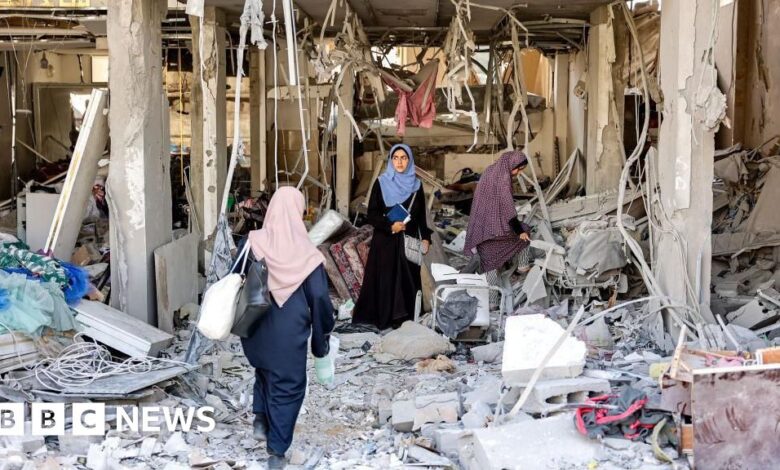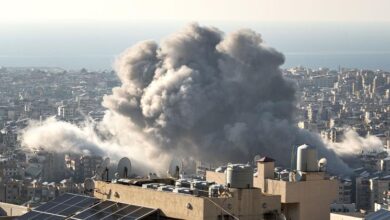Army ‘pause’ on Gaza road causes division in Israeli government

When is a ceasefire not a ceasefire? According to the Israeli military, this is a “tactical, localized pause in military operations for humanitarian purposes.”
Israel’s humanitarian aid coordinator in Gaza detailed plans for a scheduled daily halt in fighting from 08:00 to 19:00 local time, along the key route running north. from the Kerem Shalom crossing point, where aid is waiting to be delivered.
The announcement almost immediately sparked a fierce political attack from far-right government ministers – and a swift defense from the Israeli army, which stressed that it did not signal an end to fighting in southern Gaza, or any changes to access to humanitarian aid.
That the announcement proved explosive highlights the increasingly tense position of Israel’s prime minister, caught between the costs of his vague and hitherto unattainable military goals. destroy Hamas and bring back the hostages as well as the political allies he relied on to stay. in power.
The agencies will still need to coordinate their activities with the Israeli military, and Gaza’s World Food Program Director, Matt Hollingworth, said the test will see if that coordination goes smoothly. and faster or not.
But he also said that coordination is only part of the obstacles agencies face in delivering aid inside Gaza.
Sunday’s announcement, he said, “does not solve the problem of insecurity and crime. And this is the most dangerous area of the Gaza Strip today for aid delivery.”
Aid agencies reported over the weekend that continuing fighting was causing acute malnutrition in some parts of Gaza.
Israel is under pressure – from NGOs, allies and its own Supreme Court – for more aid to Gaza.
But Prime Minister Benjamin Netanyahu faces stiff opposition from two far-right cabinet colleagues, who say they will overthrow his government if he agrees to end the war, and who consider Providing aid is delaying Israel’s victory.
They reacted furiously to today’s announcement, in which the Secretary of Homeland Security, Itamar Ben-Gvir, described “whoever made this decision” as “evil” and “stupid”.
Finance Minister Bezalel Smotrich said that humanitarian aid had helped Hamas maintain power and risked “destroying the achievements of the war”.
The fact that the military was able to issue this message on a day when Israel was burying 11 of its soldiers, he said, was a sign that the leadership placed too much importance on international public opinion and did not pay enough attention to forces on the ground.
Both men have threatened to topple Netanyahu’s coalition government if he ends the war, as the United States wants.
But pressure on the costs of that war is also growing domestically. Israel’s parallel conflict with Hezbollah in Lebanon has escalated in recent days, highlighting the greater risks of continuing the war with its Hamas allies.
Last night, large crowds protested in Tel Aviv, calling on Netanyahu to end the conflict in Gaza and sign an agreement to bring home 120 Israeli hostages.
And the funeral of 11 soldiers killed in Gaza over the weekend once again drew focused questions about how the Israeli prime minister’s stated war goals could be achieved.
Mr. Netanyahu promised “complete victory” against Hamas. He argues that the current operation in Rafah is an attack on the group’s last remaining battalions in Gaza – necessary to destroy it.
But it is clear that even the dissolution of Hamas as a structured military organization does not mean a complete end to the conflict. Israeli forces still face guerrilla activities by Hamas militants in areas they had previously cleared.
And there is no indication that the group’s key leaders – Yahya Sinwar and Mohammed Deif – have been killed or captured.
For Netanyahu, ending the war will likely bring a new battle for his own political survival.
The apparent division today between his army and his allies highlights the tensions between rhetoric and reality in this war.
And the tensions Netanyahu faces in confronting them: caught between the promise of “total victory” and the prospect of a “forever war.”




